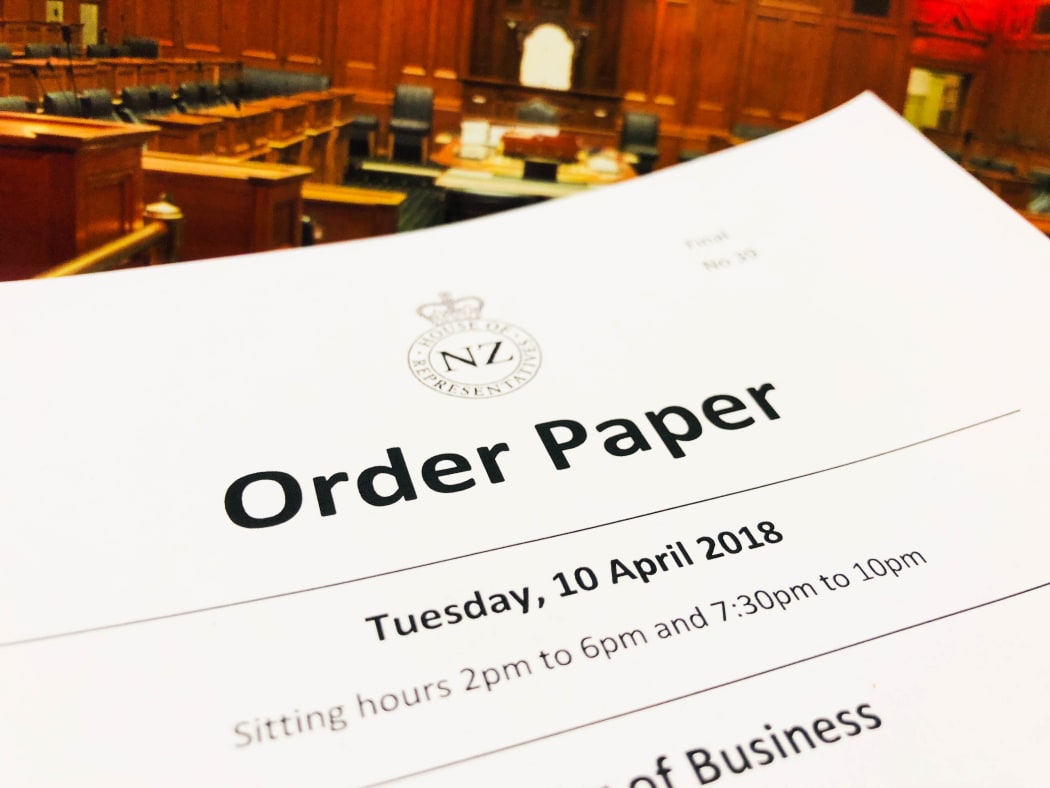After question time in the House MPs move on to “Government orders of the day” which is just another way of saying they work through proposed legislation.
Here’s what they plan to do this week (April 10 - 12).

Photo: VNP / Daniela Maoate-Cox
MPs are required to be at Parliament for scheduled sitting days, so called because they sit in those green chairs for the day. An agenda known as the Order Paper is published online each sitting day outlining what business the House plans to get through but there are more items on the list than there is time so below is an indication of what they’ll attempt to get through.
Haere rā Jonathan Coleman
-
National MP Jonathan Coleman is resigning from Parliament after 13 years in the job and will give his farewell speech, or valedictory statement, on Wednesday, 11 April at 5.40 pm. He trained as a doctor and has held positions as Minister of Health, Defence, and State Services. His resignation sparks a by-election for the Northcote electorate which is a seat Dr Coleman held since 2005.
-
Valedictory statements are often humourous, reflective, and pay tribute to family, friends, staff and even political foes.
Looking back at spending
What:
-
MPs continue to debate the Appropriations (2016/17 Confirmation and Validation) Bill which is in committee.
-
The first and second readings of this bill are done without a debate in the House and it doesn’t go to a select committee for consideration. Instead there is a debate in the Committee of the Whole House stage known as the Annual Review Debate which they started last week. It’s a ten hour debate split into sections which will be lead by the chairs of select committees which compiled the annual review reports.
The sections for debate are:
-
Economic Development and Infrastructure Sector
-
Education Sector
-
Environment Sector
-
External Sector
-
Finance and Government Administration Sector
-
Health Sector
-
Justice Sector
-
Māori, Other Populations and Cultural Sector
-
Primary Sector
-
Social Development and Housing Sector
The House has already got through the first three and is up to the External Sector.
Why:
- This bill is part of the financial cycle of Parliament. The budget sets out the plan for where money will be spent and the annual reviews check up on how the money was spent at the end of the financial year. The bosses of government funded entities have already been quizzed on their performance by select committees and now its a chance for MPs to defend or attack the past year’s spending.
Managing tūpāpaku (body of a dead person)
What:
-
The first reading of the Coroners (Access to Body of Dead Person) Amendment Bill.
-
It will require coroners require coroners to consider tikanga Māori and other cultures when deciding it someone should be allowed to stay with the tūpāpaku (body).
Why:
-
This is the result of an inquiry by the Māori Affairs Committee which looked at whānau access to and management of tūpāpaku, or deceased persons.
-
The committee heard that burial customs can vary between cultures with some requiring same day burial and others needing immediate access to the body which means problems are caused when the body's release is delayed so it has recommended some changes to the coronial system.
Privacy online
What:
-
The first reading of the Privacy Bill which is a rewrite of the Privacy Act 1993
Why:
-
Technology keeps improving the way people are connected and how personal information is accessed and stored, like social media platforms, smartphones, and cloud storage, so it’s time to update the Act. Facebook has been in the spotlight recently including a stoush with the Privacy Commissioner.
Planning for well-being
What:
-
The Local Government (Community Well-Being) Amendment Bill will have its first reading.
-
Puts some things back into the Local Government Act 2002 that were removed in by the previous government allows local governments to consider things like social, environmental well being in their planning process.
Voting online
What:
-
The first reading of the Local Electoral Matters Bill.
-
It’s an omnibus bill meaning it will make changes to more than one Act. One of those changes is to “support the conduct of trials of novel voting methods” like online voting.
Ngāi Tai ki Tāmaki settlement
What:
-
The second reading of the Ngāi Tai ki Tāmaki Claims Settlement Bill
-
This bill gives effect to the deed of settlement signed on 7 November 2015 in which the Crown and Ngāi Tai ki Tāmaki agree to a final settlement of all historical Treaty of Waitangi claims of Ngāi Tai ki Tāmaki.
Why:
-
Settlement bills aim to resolve historical claims by Māori against the crown for breaches of the Treaty of Waitangi before 1992.
-
The Treaty, which was signed in 1840, gave sovereignty to the British Crown, allowed Māori to keep rangatiratanga (chieftainship) over their resources while giving the Crown first dibs on any land up for sale and granted Māori the same rights as British citizens.
-
Settlements include some redress to set things right which can be cultural, commercial, or financial. Once a settlement is reached it becomes law.
Power to the Commerce Commission
What:
-
The first reading of the Commerce Amendment Bill
-
Makes a couple of changes including introducing a competition studies regime, increased regulation of airports if required, and updating the alternative enforcement mechanisms available to the Commerce Commission.
You can see how much the House gets done each sitting day by going here: Daily progress in the House



